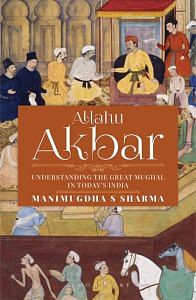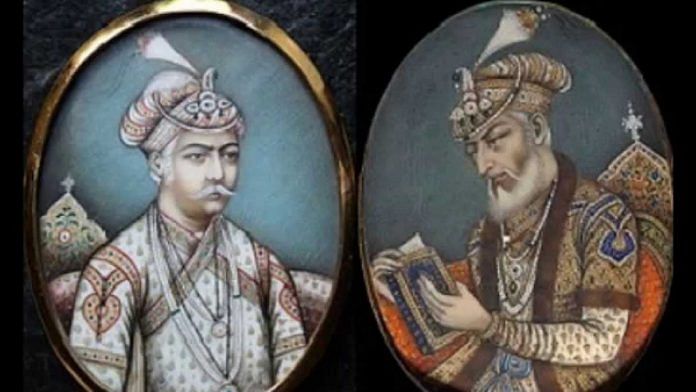Another account of the reign of Akbar called Tazkirat ul-Muluk by Rafiuddin Ibrahim narrates two fascinating incidents about Akbar to illustrate Akbar’s unconventional behaviour. One he says happened when a relative of Shah Tahmasp came to Agra and preparations were made to give him a grand reception. Ibrahim says he had then come from Gujarat and had gone to see a pavilion erected for the reception out of curiosity. Professor Iqtidar Alam Khan quotes this extract from Ibrahim’s work in his recent book on Akbar:
…all of a sudden there arose a clamour of ‘Cheers for the King’ (badshah salamat). From this circumstance, I concluded that the king had arrived. I looked to my left and my right but could not find anyone with the appearance of a king. As I turned around I saw, standing there, a young man of about twenty years. He supported his head on one of his hands, which rested on the shoulder of a companion. I guessed he was the king. But the men continued to stand around rubbing shoulders with each other. No one [bothered] with observing etiquette—of showing respect [to the king]. I took position at a short distance and observed what was happening. I was greatly surprised and asked (those present): ‘Is the custom of showing respect not observed at this court? No one has paid respects to the king.’ They replied: ‘As compared to other realms the tradition of showing respect and observing etiquette is much more elaborate here. But this king is an exceedingly informal person. He often comes out of his private apartment in ordinary dress and mixes with the people around him, making no distinction between friends and strangers. In this situation, how is it possible [for men] to observe etiquette all the time?’…. In the second incident, Ibrahim says he saw Akbar flying a kite on the terrace of his palace with his head uncovered and wearing only a lungi.
So, lungi was Akbar’s favourite, it seems. Yet we didn’t see even one in Jodhaa Akbar. This Akbar was forever dressed in ceremonial robes and always sounded prim and proper.
Also read: As RSS praises Dara Shikoh, it’s time to give this liberal face of Islam his due
The closest any Indian political leader of today comes to this unconventional behaviour of Akbar is perhaps Rahul Gandhi. For security personnel of Special Protection Group who guard Rahul Gandhi, his unconventional ways are a nightmare. Indeed, former Union Home Minister Rajnath Singh once publicly complained about Rahul Gandhi violating security protocol a ‘hundred times’ and freely mixing with people.
Rahul Gandhi has ridden bikes; sat down on the ground to eat with poor farmers and Dalit families at their homes; freely mixed with the common man for friendly chit-chats and taking selfies; and has even been kissed by women admirers while attending public functions. And on most of these occasions, Rahul Gandhi has been spotted wearing either casuals or the kurta-pyjamas that he wears in a semi-formal way. To what extent such mingling by Rahul Gandhi has benefited the Congress party is unknown.
But Narendra Modi has also tried to do something similar in a very controlled environment and in a very limited way, but a pliant press has amplified it several times to make it appear as a god-like leader’s magnanimity in reaching out to the masses in such a novel way. In reality, Modi’s actions have been way less spontaneous and limited in their scope than Rahul Gandhi’s. For instance, Modi hasn’t gone on bike rides, or eaten a meal from a Dalit man’s kitchen, or let anyone come so close to him. On every Independence Day since 2014, Modi has ‘baffled’ his security detail by going to the children’s enclosures to meet them. Every year, the press has celebrated it as a ‘break from protocol’ by the prime minister. This cycle of being surprised and celebrating it as a novel way has continued for four years now. But if we see the kind of leader that Narendra Modi has aspired to be like, then the image is closer to that of Delhi Sultan Ghiyasuddin Balban and Mughal Emperor Aurangzeb.
Balban believed in the divine right of kingship and tried every means to project himself as a cut above the rest. He was the first Indian king to adopt the Persian concept of ‘zill Allah’ and made himself appear as a god-like figure. He controlled the chahalgani or the powerful clique of forty nobles, pretty much like Modi controls the BJP today.
Also read: The good Muslim-bad Muslim binary is as old as Nehru
Aurangzeb, on the other hand, was a darling of the austere and the orthodox. His austere ways are appreciated even by the modern Hindu Right. That Aurangzeb observed Islamic rituals very strictly and kept himself away from wine and such other perceived vices made him the heartthrob of the ulema, the conservative Muslims and the fanatics. Narendra Modi’s austere ways that are much advertised, such as observing navratra fasts while meeting President Barack Obama and having only lemon juice for dinner were endorsed and celebrated by the orthodox and fanatical Hindus. And despite wearing a monogrammed pinstripe suit costing ‘10 lakh’, his calling himself a faqir (mendicant) is unquestioningly accepted by his followers.
But it fascinates me that the real Akbar behaved like a commoner, dressed like a commoner and even talked like a commoner, using expletives unreservedly. This candid Akbar has somehow frightened historians and continues to frighten modern filmmakers who otherwise have no qualms about making movies where principal characters freely mouth abuses.
Somehow, it never occurs to us lay people that invective, abuse, expletives have not been the sole preserve of our modern world; our ancestors in the distant past have had their own lists of expletives to draw from. That’s because even though languages have undergone changes, human emotions have remained the same.
Asif’s Mughal-e-Azamis still pretty much the gold standard for any period film in India. Nobody has ever since tried to recreate the over-elaborate court culture and the grandeur of the Mughals. But this is also the most historically inaccurate film on the Mughals till date. If Jodha Bai was one legend that Gowariker picked, Anarkali was another that K. Asif picked. If we pit them head to head, then Jodhaa Akbarwins hands down in accuracy.
 This excerpt from Allahu Akbar: Understanding the Great Mughal in Today’s India by Manimugdha S. Sharma has been published with permission from Bloomsbury India.
This excerpt from Allahu Akbar: Understanding the Great Mughal in Today’s India by Manimugdha S. Sharma has been published with permission from Bloomsbury India.




Surely this article is written in a lighter mood and not meant to be accurate. Calling Modi austere would be insulting austeres. Calling him a fakir would be insulting fakirs. Unless you can coin a weird phrase, Ostentatious Austere. Which in plain language that Akbar apparently used to use, would mean: fraud!
Raul is Bahadur Shah Zafar.
Brilliant!! I didn’t read the article earlier but I have now read it after your comment. I see the writer is stretching his/her imagination thinking like a movie script writer. I mean, Rahul Gandhi, who hasn’t had one single portfolio, one single administrative responsibility in all his life, is being compared to a successful emperor. Oh sorry for my mistake. Rahul did have the presidentship of his party. He lost, and he quit. WOW!!! He should be now known as Rahul The Great.
Finally one smart author in this Sanghi den called ThePrint. A few more Similarities. Both Rahulji and Akbarji had foreign parents. Both had ancestors accused of slaughtering thousands of people. Both are accused by sanghis for coveting females of multi religions and ethnicities. Both were playful. Both used to go missing in action leaving day to day things to others…one major difference is Akbar didn’t have a great sister like Priyankaji.. but feeling great to see such good articles
Ha, ha. Though I am quite a fan of Akbar for his pluralism, your comment reminds me of a comment by a Pakistani taxi driver during a small conversation. He pointed to a heritage university building in a Western city and said that when Brits were building universities, Mughals and other South Asian rulers were cavorting with their harem. He said it with some bitterness in his voice.
Imran Khan has already married for the fourth time, and had few concubines here and there. Pakistan taxi driver was telling the truth..
Aurangzeb never sought popular support. Infact his actions were such that he would have been dreaded by his people.
He imprisoned his father and killed his brothers. Other highlights of his reign – Breaking temples and beheading sikhs.
None such things done by NaMo. You may hate him but a lot many Indians love and admire the man. Open your eyes.
But of course the author is a neutral intellectual historian. So wrong of us to question their viewpoints.
Why not to Namo asAK , AS to Azb looking at their working style only difference was Jidhad VS JSR
Akbar fell into the category of ‘boundary-less leaders’. Western nations often complain that foreign migrants do not make an effort to integrate with host country’s culture. Though he was born in India, as a second generation foreign migrant adopted his homeland with enthusiasm. India cannot complain that he couldn’t integrate well. He became a true HINDUSTANI.
Who told you ask 30000 people he killed in one day. Compare any present with medieval terrorist/thugs like them would be injustice to present generation
The greatest of the Mughals. If he had to be compared to a modern figure, although one would not consider it an apt choice, it would be more PM Jawaharlal Nehru than his great grandson.
I cannot agree with you on this Ashok. Though Nehruji did have one commonality with Akbar (multi ethnic female relationship s) he was not playful and did maintain the distance between him and other not so sophisticated Indians (justified fully but Sanghis don’t understand). So it is Rahulji who is like Akbar